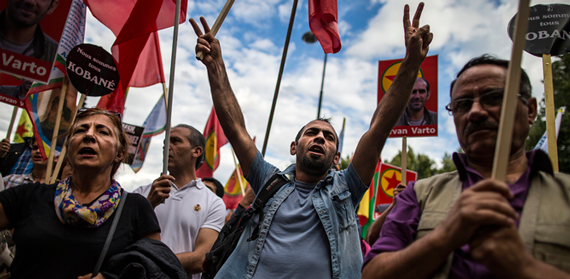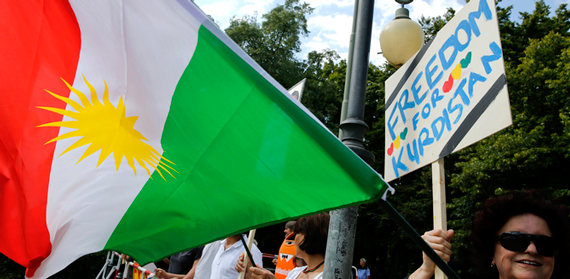Protesters in Paris speak out against attacks on the PKK. EPA/Ian Langsdon
Guest post by Dr. Bahar Baser, Centre for Trust, Peace and Social Relations
Every day the renewed conflict between the Turkish military and the PKK deepens existing rifts in Turkey – particularly following the bombing in Ankara that killed at least 99 people.
There have been numerous attacks on buildings associated with the pro-Kurdish HDP political party in recent months. And a group of ultra-nationalists were reported to have tried to lynch a group of Kurds.
Now, the division is starting to play out elsewhere in Europe.
Around 4m migrants from Turkey live elsewhere in Europe. Some are Turks and some Kurds, and they usually share the same neighbourhoods.
Kurdish diaspora groups have been protesting in Europe over the Turkish state’s military actions against the PKK, civilian deaths in clashes with the authorities and about curfews imposed in various cities in south-east Turkey such as Cizre.
On the other side, Turkish groups have organised large demonstrations “condemning terrorism”. These appear to be taking place without the acknowledgement of the atrocities committed by the Turkish state. The Turkish president, Recep Tayyip Erdoğan, even attended one such rally in Strasbourg and managed to turn the demonstration into an election rally. In doing so he made it clear that the Turkish diaspora is an important force in a national power struggle.
Conflict spreads
It’s not just protest, though. There have been violent clashes between Kurdish and Turkish activists in cities across Germany and in the Netherlands. One Kurdish organisation in Rotterdam appealed to the Dutch police and politicians to step in to calm Turkish aggression towards Kurds.
In Sweden, where clashes between Turkish and Kurdish groups are less frequent, a group of Turkish ultra-nationalists organised a protest to condemn the PKK. That, in turn, provoked a counter-protest by a small Kurdish group. The police had to intervene in order to stop the violence.
And as the November 1 election approaches there are reports that the German interior ministry perceives this situation as a serious cause for concern. In London, a Banksy piece depicting Erdogan and his son Bilal discussing where to hide the millions they stole from Turkish citizens was defaced by members of the local Turkish diaspora. It was cleaned again by Kurds from the same neighbourhood.
Historic contentions
This is but the latest eruption of violence in a conflict that spilled outside Turkish borders in the 1980s. And aside from violent and non-violent confrontational encounters, there has long been political competition between diaspora organisations at the local, national and supranational levels.
Increasing ethnic awareness among the Kurds in Europe throughout the years brought with it ethnic differentiation. Lobby groups began to emerge on the Kurdish side, which caused frustration among Turks. Turkish and Kurdish groups outside Turkey became ever more sharply divided, especially as the conflict in Turkey intensified.
Kurdish protesters in Germany. Reuters/Fabrizio Bensch
Both communities followed developments in Turkey closely – and violent clashes took place in Germany, France, the Netherlands and Belgium each time an event of political importance took place in Turkey, particularly during the turbulent 1990s.
Diaspora nationalism is often seen as a result of oppression in the host or home country. But studies show that groups that do not suffer from marginalisation can also get involved – as Turkish communities seem to do in Europe. Tensions rooted in homeland conflicts might reveal themselves in the host country in the form of clashes between rival groups, verbal or discursive contentions, social and physical separation or mutual avoidance.
Outbreaks of violence can also lead to the groups involved being stigmatised by their host societies and can pour fuel on debates about migration and integration. Without considering what has driven tensions in their countries, politicians and the media make sweeping assessments of migrant groups, depicting them as threats to national security.
What they fail to realise is that while homeland conflicts inherently spill over into other countries, the turbulence abroad is not necessarily an exact reflection of the “home” conflict. The root causes of tensions do not simply disappear when people move to a new country, but new experiences also shape and channel them.
European countries should acknowledge that these conflicts do not solely belong to the Middle East. Some of the people experiencing friction at the moment are their citizens now – and they must understand the reasons behind their grievances and work towards reconciling the factions within their borders.
When Turkey parked the idea of becoming a member of the European Union, the EU lost its leverage on Turkish politics. But that could change now that the two parties seem to be signing up to closer cooperation. In exchange for help with its migrant crisis, the EU seems to be offering to make it easier for Turkish nationals to travel outside the country. That will lead to even more diaspora communities – making it all the more important to address the long-running tensions between them.
Originally written for ‘The Conversation’.





Comments are disabled